ENGLISH HOME LANGUAGE PAPER 2 GRADE 12 QUESTIONS - NSC PAST PAPERS AND MEMOS SEPTEMBER 2016
Share via Whatsapp Join our WhatsApp Group Join our Telegram GroupENGLISH HOME LANGUAGE P2
GRADE 12
NATIONAL SENIOR CERTIFICATE
SEPTEMBER 2016
INSTRUCTIONS AND INFORMATION
- Please read this page carefully before you begin to answer questions.
- Do not attempt to read the entire question paper. Consult the table of contents on the next page and mark the numbers of the questions set on texts you have studied this year. Thereafter, read these questions and choose the ones you wish to answer.
- This question paper consists of THREE sections.
SECTION A: POETRY (30)
SECTION B: NOVEL (25)
SECTION C: DRAMA (25) - Follow the instructions at the beginning of each section carefully.
- Answer FIVE QUESTIONS in all: THREE in SECTION A, ONE in SECTION B and ONE in SECTION C. Use the checklist to assist you.
- Number the answers exactly as the questions have been numbered in the question paper.
- Start each section on a NEW page.
- Write neatly and legibly.
- Suggested time management:
SECTION A: approximately 40 minutes
SECTION B: approximately 55 minutes
SECTION C: approximately 55 minutes - LENGTH OF ANSWERS:
- Essay questions on poetry should be answered in 250–300 words.
- Essay questions on the Novel and Drama sections should be answered in 400–450 words.
- The length of answers to contextual questions should be determined by the mark allocation. Candidates should aim for conciseness and relevance.
- CHOICE OF ANSWERS FOR SECTIONS B (NOVEL) AND C (DRAMA):
- Answer ONLY questions on the novel and the drama you have studied.
- Answer ONE ESSAY QUESTION and ONE CONTEXTUAL QUESTION. If you answer the essay question in SECTION B, you must answer the contextual question in SECTION C. If you answer the contextual question in SECTION B, you must answer the essay question in SECTION C.
TABLE OF CONTENTS
SECTION A: POETRY
| PRESCRIBED POETRY ANSWER ANY TWO QUESTIONS. | |||
| QUESTION 1 Old folks laugh | Essay question | 10 marks | Page 5 |
| QUESTION 2 In detention | Contextual question | 10 marks | Page 6 |
| QUESTION 3 London | Contextual question | 10 marks | Page 7 |
| QUESTION 4 When I have fears that I may cease to be | Contextual question | 10 marks | Page 8 |
| AND | |||
| UNSEEN POETRY COMPULSORY QUESTION. | |||
| QUESTION 5 I know a place in Africa | Contextual question | 10 marks | Page 59 |
NOTE:
In sections B and C, answer ONE ESSAY and ONE CONTEXTUAL question. If you answer an essay question from SECTION B, you must answer a contextual question from SECTION C. If you answer a contextual question from SECTION B, you must answer an essay question from SECTION C.
SECTION B: NOVEL
ANSWER ONLY ON THE NOVEL YOU HAVE STUDIED.
ANSWER ANY ONE OF THE FOLLOWING SIX QUESTIONS.
| QUESTION 6 Animal Farm OR | Essay question | 25 MARKS | Page 10 |
| QUESTION 7 Animal Farm OR | Contextual question | 25 MARKS | Page 10 |
| QUESTION 8 Pride and Prejudice OR | Essay question | 25 MARKS | Page 12 |
| QUESTION 9 Pride and Prejudice OR | Contextual question | 25 MARKS | Page 12 |
| QUESTION 10 The Great Gatsby OR | Essay question | 25 MARKS | Page 14 |
| QUESTION 11 The Great Gatsby | Contextual question | 25 MARKS | Page 15 |
SECTION C: DRAMA
ANSWER ONLY ON THE DRAMA YOU HAVE STUDIED.
ANSWER ANY ONE OF THE FOLLOWING FOUR QUESTIONS.
| QUESTION 12 Othello OR | Essay question | 25 marks | Page 17 |
| QUESTION 13 Othello OR | Contextual question | 25 marks | Page 17 |
| QUESTION 14 The Crucible OR | Essay question | 25 marks | Page 17 |
| QUESTION 15 The Crucible OR | Contextual question | 25 marks | Page 17 |
CHECKLIST
Use this checklist to ensure that you have answered the correct number of questions.
| SECTION | QUESTION NUMBERS | NO. OF QUESTIONS TO ANSWER | TICK |
| A: POETRY (Prescribed Poetry) | 1-4 | 2 | |
| A: POETRY (Unseen Poem) | 5 | 1 | |
| B: NOVEL (Essay or Contextual) | 6-11 | 1 | |
| C: DRAMA (Essay or Contextual) | 12-15 | 1 | |
| NOTE: In SECTIONS B and C, answer ONE ESSAY and ONE CONTEXTUAL question. | |||
SECTION A: POETRY
PRESCRIBED POETRY: Answer ANY TWO of the following questions.
QUESTION 1: PRESCRIBED POETRY – ESSAY QUESTION

In a carefully planned essay, critically discuss how the poet uses the title, imagery and diction to convey her attitude towards old age. Your essay must be 250–300 words (about ONE page) in length. [10]
OR
QUESTION 2: PRESCRIBED POETRY – CONTEXTUAL QUESTION

2.1 Comment on the appropriateness of the title. (2)
2.2 Refer to the whole poem. The first impression is that ‘he’ is clumsy and stupid.
Explain the irony of this impression. (2)
2.3 Explain how the sentence structure in lines 5–14 adds to the tone of the poem. (3)
2.4 Comment on the repetition of ‘He’ at the start of each line and how it contributes to your understanding of the poem’s message. (3)
[10]
OR
3.1 Describe the impression of Londoners that is created by the repetition of the word ‘mark(-s)’ in stanza 1. (2)
3.2 Refer to stanza 2. Explain the use of the capital letters for ‘Man’ and ‘Infant’. (2)
3.3 By referring to the imagery in stanza 3, explain how it shows the poet’s critical attitude towards the social conditions in England at the time. (3)
3.4 How does the poet’s message reach a climax in stanza 4? Refer closely to the poem in support of your answer. (3)
[10]
OR

QUESTION 4: PRESCRIBED POETRY – CONTEXTUAL QUESTION
4.1 Explain the simile in the first quatrain. (2)
4.2 What does the speaker reveal about his dreams when he refers to ‘huge cloudy symbols’ and ‘a high romance’ (line 6)? (2)
4.3 Refer to lines 10–11. Describe how the speaker uses repetition to convey his attitude towards romantic love. (3)
4.4 Comment critically on the slower pace in the last three lines and how it adds to the tone of the poem. (3)
[10]
AND
UNSEEN POETRY: The following question is compulsory.
QUESTION 5: UNSEEN POETRY – CONTEXTUAL QUESTION

5.1 By referring to the diction used in the poem, prove that the poem is about Africa. (2)
5.2 Comment on the effect achieved by the lack of punctuation. (2)
5.3 Refer to the title. How does the use of pronouns and the repetition of the title in the poem add to the mood and tone? (3)
5.4 What does the wide variety of recollections and sensual images reveal about the speaker’s frame of mind? Quote in support of your answer. (3)
[10]
TOTAL SECTION A: 30
SECTION B: NOVEL
Answer ONLY on the novel you have studied.
ANIMAL FARM – GEORGE ORWELL
Answer EITHER QUESTION 6 (essay question) OR QUESTION 7 (contextual question).
QUESTION 6: ESSAY QUESTION – ANIMAL FARM
In a carefully planned essay of 400–450 words (2–2½ pages) in length, critically discuss how the use of power influenced the events in the novel. [25]
OR
QUESTION 7: CONTEXTUAL QUESTIONS – ANIMAL FARM
Read the extracts below and then answer the questions that follow.
7.1 Describe the circumstances of this meeting. (3)
7.2 Study lines 1–4. What does Old Major see as the two main obstacles humans cause in the animals’ lives? (3)
7.3 Considering the conditions on Animal Farm, what is the effect of Old Major sharing his dream with the animals? (3)
7.4 The dogs’ instinctive behaviour (lines 20–21) is an ominous sign. Explain. (3)
7.5 What does Old Major’s call to vote (lines 24–25) suggest about him? Mention TWO things. (3)
AND
EXTRACT B
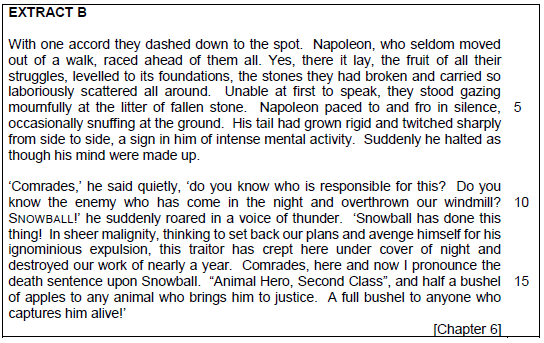
7.6 Place the extract in context by explaining why the animals are speechless and ‘gazing mournfully at the litter of fallen stone’ (lines 4–5). (3)
7.7 ‘Napoleon, who seldom moved out of a walk...’ (lines 1–2) Which aspects of Napoleon’s character does this line reveal? (3)
7.8 Compare Napoleon’s tirade in Extract B to Old Major’s speech in Extract A. Comment on the tone and purpose of each speech. (4)
[25]
OR
PRIDE AND PREJUDICE – JANE AUSTEN
Answer EITHER QUESTION 8 (essay question) OR QUESTION 9 (contextual question).
QUESTION 8: ESSAY QUESTION – PRIDE AND PREJUDICE
In a carefully planned essay of 400–450 words (2–2½ pages) in length, discuss to what extent Elizabeth’s decision to marry Darcy is influenced by those relationships and marriages around her. [25]
OR
QUESTION 9: CONTEXTUAL QUESTIONS – PRIDE AND PREJUDICE
Read the extracts below and then answer the questions that follow.
9.1 The Lucas sisters are visiting Longbourn. Describe the circumstances Charlotte is referring to when she says Elizabeth is ‘only just tolerable’ (lines 2–3). (3)
9.2 From what you know about Jane Austen’s world, explain why the women are discussing in detail what had happened during the Meryton Ball. (3)
9.3 Compare Mrs. Bennet’s willingness to criticise Darcy to Jane’s questions in line 8. (3)
9.4 Charlotte’s reasons that Darcy has ‘a right to be proud’ (line 25) underline her view of marriage. Discuss how her attitude here determines her choice of husband. (3)
9.5 From evidence in this extract, discuss how the title of the novel is relevant to the characters of Elizabeth and Darcy. (3)
AND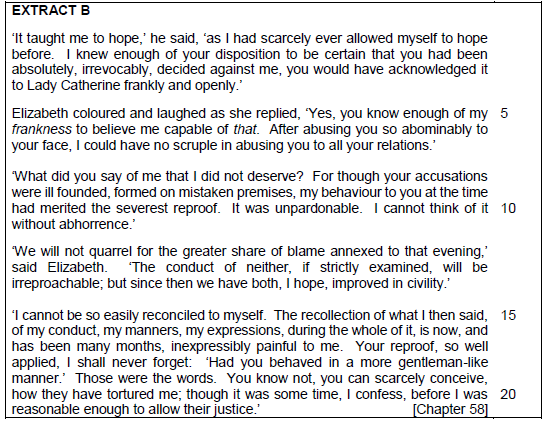
9.6 Briefly relate Elizabeth’s meeting with Lady Catherine and discuss how ‘frankly and openly’ (line 4) Elizabeth’s conversation with Lady Catherine was. (3)
9.7 Comment on the nature of the relationship between Darcy and Elizabeth as it is revealed in this extract. (3)
9.8 Refer to Extract A and Extract B. There is a distinct change in the relationship between Darcy and Elizabeth as seen in Extract A and in Extract B. Account for the change by referring to both extracts. (4)
[25]
OR
THE GREAT GATSBY – F. SCOTT FITZGERALD
Answer EITHER QUESTION 10 (essay question) OR QUESTION 11 (contextual question).
QUESTION 10: ESSAY QUESTION – THE GREAT GATSBY
In a carefully planned essay of 400–450 words (2–2½ pages) in length, assess critically to what extent the trends and technological development of 1920s American society influence events in the novel. [25]
OR
QUESTION 11: CONTEXTUAL QUESTIONS – THE GREAT GATSBY
Read the extracts below and answer the questions that follow.
11.1 Place the extract in context. (3)
11.2 Explain clearly why Myrtle’s irritation with ‘the shiftlessness of the lower orders’ (line 2) is ironic. (3)
11.3 Explain the presence of the dog (line 4), and how it later contributes to George Wilson’s distressed state. (3)
11.4 Refer to lines 15–17. From what you know about the rest of the novel, comment on the fact that someone with Catherine’s social standing attends one of Gatsby’s parties. (3)
11.5 Refer to lines 19–23. Comment on how Catherine’s opinion of Gatsby adds to the myth of Gatsby’s character. Consider the rest of the novel in your answer. (3)
AND
EXTRACT B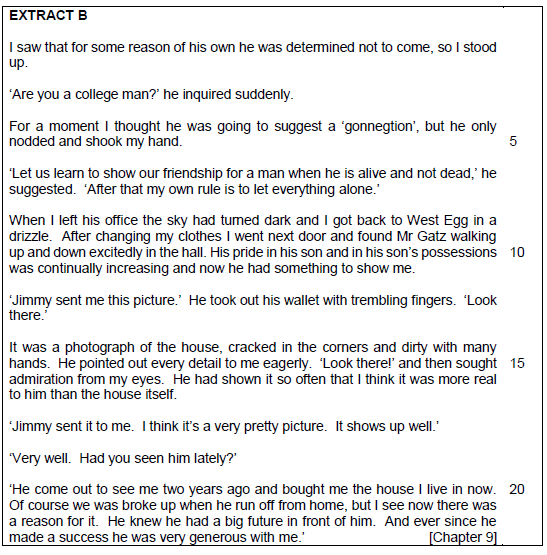
11.6 Wolfsheim’s belief to ‘let everything alone’ (line 7) and thus not attend Gatsby’s funeral is typical of Gatsby’s friends. Discuss. (3)
11.7 Discuss whether Mr Gatz’s admiration of his son Jimmy is realistic or not. (3)
11.8 Aspects of the harsh and unpleasant realities of the American Dream are evident in both extracts. Describe how the ‘dream’ shows its ugly side in each extract. (4)
[25]
TOTAL SECTION B: 25
AND
SECTION C: DRAMA
Answer ONLY on the drama you have studied.
OTHELLO – WILLIAM SHAKESPEARE
Answer EITHER QUESTION 12 (essay question) OR QUESTION 13 (contextual question).
QUESTION 12: ESSAY QUESTION – OTHELLO
In a carefully planned essay of 400–450 words (2–2½ pages) in length, discuss to what extent the dramatic events are influenced by the setting being on the island, Cyprus. [25]
OR
QUESTION 13: CONTEXTUAL QUESTION – OTHELLO
Read the extracts below and answer the questions that follow.
13.1 Place the extract in context. (3)
13.2 Cassio denies that he is drunk (line 1). From what you know about the rest of the play, comment on the relevance of his denial. (3)
13.3 How truthful is Iago when he compares Cassio to ‘a soldier fit to stand by Caesar’ (line 4)? Support your answer by referring to previous utterances by Iago. (3)
13.4 How does Iago’s conversation with Montano here form part of his scheme to discredit Cassio? Quote in support of your answer. (3)
13.5 From what you know about the rest of the play, comment on the irony of Montano’s assessment of Othello’s ‘good nature’ and Cassio’s ‘virtue’ (lines 16–17). (3)
AND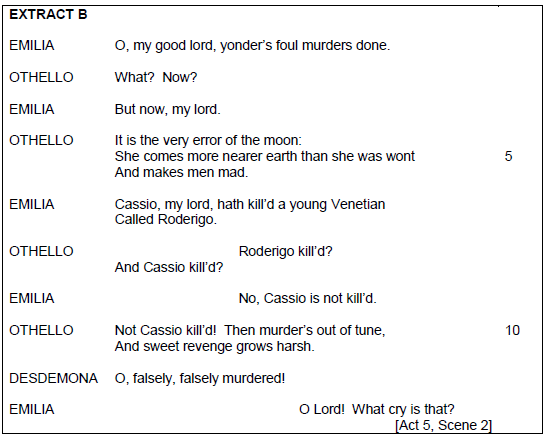
13.6 Is Othello’s reply that murders are ‘the very error of the moon’ (line 4) one that you would expect from an experienced military man? Consider Othello’s state of mind as part of your answer. (3)
13.7 Explain why the ‘sweet revenge’ (line 11) has now become ‘harsh’. (3)
13.8 Comment on Iago’s ability to mislead characters as it is evident in Extract A and Extract B. (4)
[25]
OR
THE CRUCIBLE – ARTHUR MILLER
Answer EITHER QUESTION 14 (essay question) OR QUESTION 15 (contextual question).
QUESTION 14: ESSAY QUESTION – THE CRUCIBLE
In a carefully planned essay of 400–450 words (2–2½ pages) in length, critically assess to what extent the court room contributes to the dramatic ending of the drama. [25]
OR
QUESTION 15: CONTEXTUAL QUESTION – THE CRUCIBLE
Read the extracts below and then answer the questions that follow.
15.1 Explain why Reverend Hale is on his way to Salem. (3)
15.2 Refer to lines 2–6. What do Rebecca’s words reveal about her and Salem? You may quote in support of your answer. (3)
15.3 What does the reader learn about Putnam from his reply in lines 11–13? Mention TWO things. (3)
15.4 Refer to Mrs Putnam’s reply to Rebecca in lines 15–18. As the director of the play, explain how you would instruct the actress to act and say these words. (3)
15.5 In lines 21–22 Proctor reminds Putnam that ‘we vote by name...not by acreage.’ How do these words highlight an important difference between the two men? (3)
AND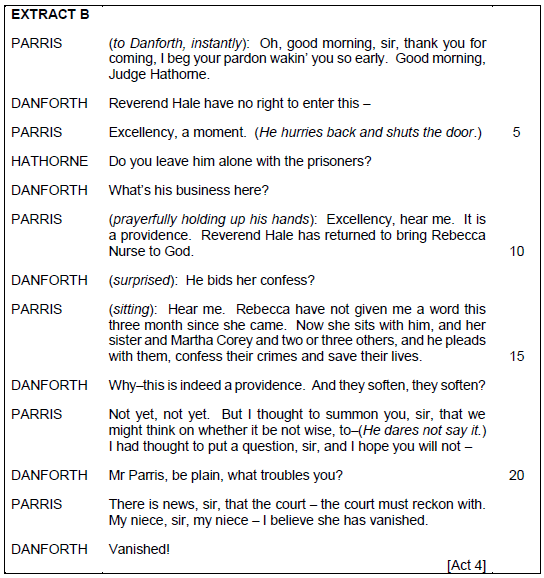
15.6 Place this extract in context by explaining the irony in Danforth and Hathorne’s unhappiness about Hale’s presence. (3)
15.7 Provide reasons why Parris only now reveals that Abigail ‘has vanished’ (line 22). (3)
15.8 Refer to Extracts A and B. Comment on Rebecca’s role in both extracts and Parris’s assumption that she would be one of those to ‘confess their crimes’ (line 15). (4)
[25]
TOTAL SECTION C: 25
GRAND TOTAL: 80